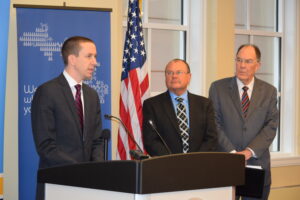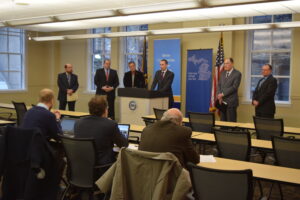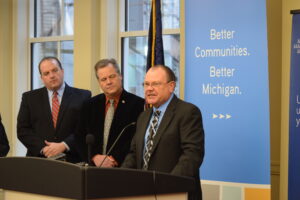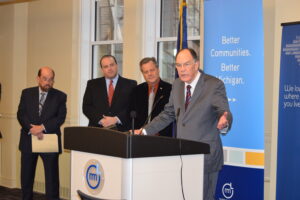Roseville, Algonac, Dowagiac Officials Are Among Plaintiffs in Federal Lawsuit Against ‘Gag Order’ Law
By: Dene Westbrook,
January 26, 2016

League President and Dearborn Mayor Jack O’Reilly leads a press conference announcing a lawsuit against PA 269.
City officials from Roseville, Algonac, Dowagiac are among 18 plaintiffs in a federal lawsuit filed today in Detroit charging that a “gag order” provision in Public Act 269 is unconstitutional and asking that the law be overturned. (View a press release about the League plaintiffs in the lawsuit and view a statewide press release about the suit.)
Subsection 57(3) of Public Act 269, which amended Michigan’s Campaign Finance Act, prohibits elected and appointed public and school officials from providing factual information to voters about local ballot measures within 60 days of an election. State law already prohibits governmental officials from using tax dollars to advocate for or against a proposal. This new gag order goes far beyond what is constitutionally permissible.
“It’s an absolute gag order preventing public officials from addressing their constituents and residents of about matters of local concern,” said Scott Eldridge, an attorney with Miller, Canfield, Paddock and Stone who has filed the lawsuit against Public Act 269. “It’s so overly broad and vague that it penalizes public officials with a crime if they speak in even an objectively neutral tone about ballot issues.”
The League hosted a press conference Tuesday afternoon to announce the lawsuit. The news conference was led by Board President and Dearborn Mayor Jack O’Reilly and included some of the 18 plaintiffs named in the suit. League members serving as plaintiffs are Roseville Mayor Robert Taylor, Dowagiac Mayor Donald Lyons and Algonac City Manager Doug Alexander.
About a dozen media members participated in the news conference including reporters from the Detroit News, mlive.com, the Detroit Free Press, Dowagiac Daily News, MIRS News Service, Gongwer News Service, the Associated Press, Michigan Public Radio, Michigan Radio Network and TV 6 and TV 10, both out of Lansing.
More than 100 school districts and local governments with issues on the March 8 ballot already are being harmed by the new law, which bans local officials or employees of local governments and school districts from using public resources to communicate with voters by giving them factual information about a ballot measure through radio, television, mass mailing or prerecorded telephone messages in the final two months of an election.
The result will be that uninformed voters are likely to first learn about complex matters when they look at ballots on election day without having received basic information such as what the proposal is about, how much it will save or cost them and what the consequences of a yes or no vote are. In addition to being unconstitutional, the law will also negatively affect local credit ratings and result in higher costs for local taxpayers, Moody’s Investors Service has warned.
Algonac City Manager Doug Alexander said his city is requesting voters to allow the city to enter a 20-year lease agreement with the US Coast Guard for 200 feet of Riverfront Park dockage in exchange for the Coast Guard repairing at its cost the seawall at that location.
“Under the current law we can’t mail any information to voters about this lease agreement with the Coast Guard. For example, we would have normally explained a ballot issue like this in our quarterly newsletter that is mailed to about 1,900 city households,” Alexander said. “Should I expect a local group of citizens to get together and form a campaign committee to explain this to the voters? Not likely, nor should they have to. This is a function of government. People expect their local government to do these types of negotiations, put these questions before them and then share factual information with the public so that they can make educated decisions. Our newsletter would have just stated factual, objective and neutral information to our residents. But we can no longer do that.”
Dowagiac Mayor Donald Lyons said his city is asking voters to change the city charter to have its clerk appointed instead of elected.
“This law strips away or brings into question the legality of many of the most effective means of communication that we have traditionally used,” Lyons said. “For a community that values transparency, the removal of some of our most effective means of communicating with our electorate by a poorly crafted and confusing piece of last-minute legislation is simply wrong. It is a sad day when the state Legislature tells me that I can no longer communicate effectively with the people I was elected to serve.”
Here are some excerpts from a couple of the media reports:
From the Detroit News:
… the law violates the First Amendment to the U.S. Constitution by banning “the free flow of objectively neutral, core political speech,” according to a complaint filed in U.S. Eastern District Court in Detroit.

Attorney Scott Eldridge of Miller Canfield answers questions from the media during Tuesday’s news conference.
The suit also contends the law violates the 14th Amendment, which guarantees the right to due process, by subjecting public officials to criminal prosecution without providing adequate notice or guidance about what amounts to a violation.
“As a result, it chills speech altogether,” said Scott Eldridge, an attorney with Miller, Canfield, Paddock and Stone who is representing the plaintiffs.
“This law was created by the Legislature in the dark hours of the night, and this kind of last-minute, knee-jerk policy making is exactly what continues to plague our great state,” (said Warren Consolidated School District Superintendent Robert D. Livernois, a plaintiff in the suit). “In this particular case, that law resulted in the trampling — and I mean trampling — of our constitutional rights.”
The lawsuit alleges that the 60-day limitation violates the United States Constitution’s free speech protections, ensconced in the first amendment. It also alleges the 14th amendment, which protects due process, was violated.
“We’re confident that the court is going to rule in favor of free speech and against censorship,” …Eldridge (said).
… Dowagiac Mayor Donald Lyons said that in his 18 years as mayor he’s regularly communicated with residents ahead of ballot proposals to explain them.
“Think about this for a minute. Think about the fact that if I were to perform my duty as I have performed it over the last 18 years I would be subject to a fine, jail sentence and to charging with a misdemeanor, all because I tried to do my job,” Lyons said.
Douglas Alexander, Algonac city manager, said that while much of the attention is on ballot initiatives that have to deal with taxes, he’s concerned about what it will mean for a March 8 proposal in his community to approve a lease agreement with the U.S. Coast Guard for a section of the Algonac seawall.
In the past, the city would have provided “factual, objective and neutral information” in its quarterly newsletter “so our residents could make an informed decision.”
“Now, we can no longer do that,” Alexander said. “We would have explained that the Coast Guard would be paying for repairs.”
Residents, he said, will have questions.
“Should I expect every one of them to pick up the phone and call me? I hope not. But that’s the alternative we have now and it doesn’t make sense.”
From the Associated Press:
…But groups representing school districts, municipalities and other government entities said the “fix” pending in the House Elections Committee is inadequate and would only let them communicate the election date and a 100-word ballot summary of the proposal to voters.
Dearborn Mayor Jack O’Reilly, president of the Michigan Municipal League, said the secretary of state found only five valid complaints in three years of a local entity improperly advocating for a ballot measure.




